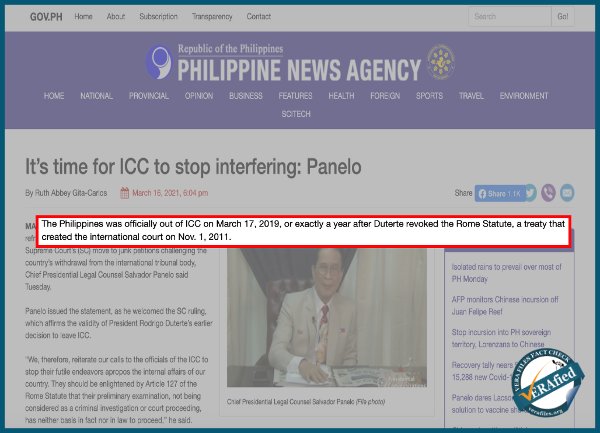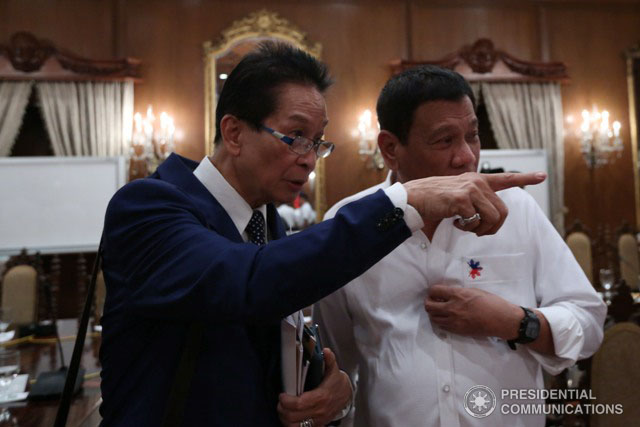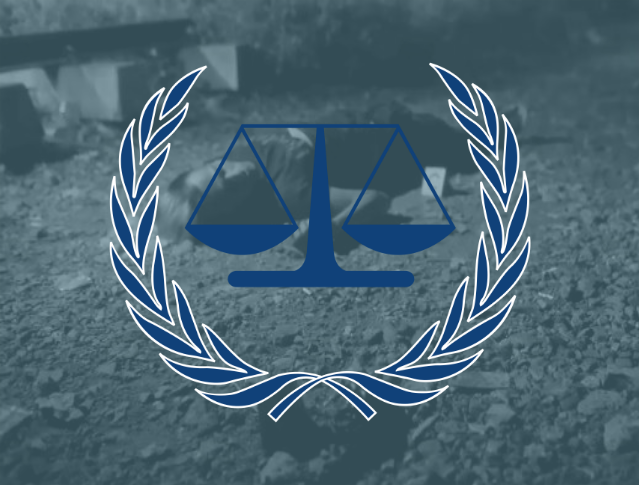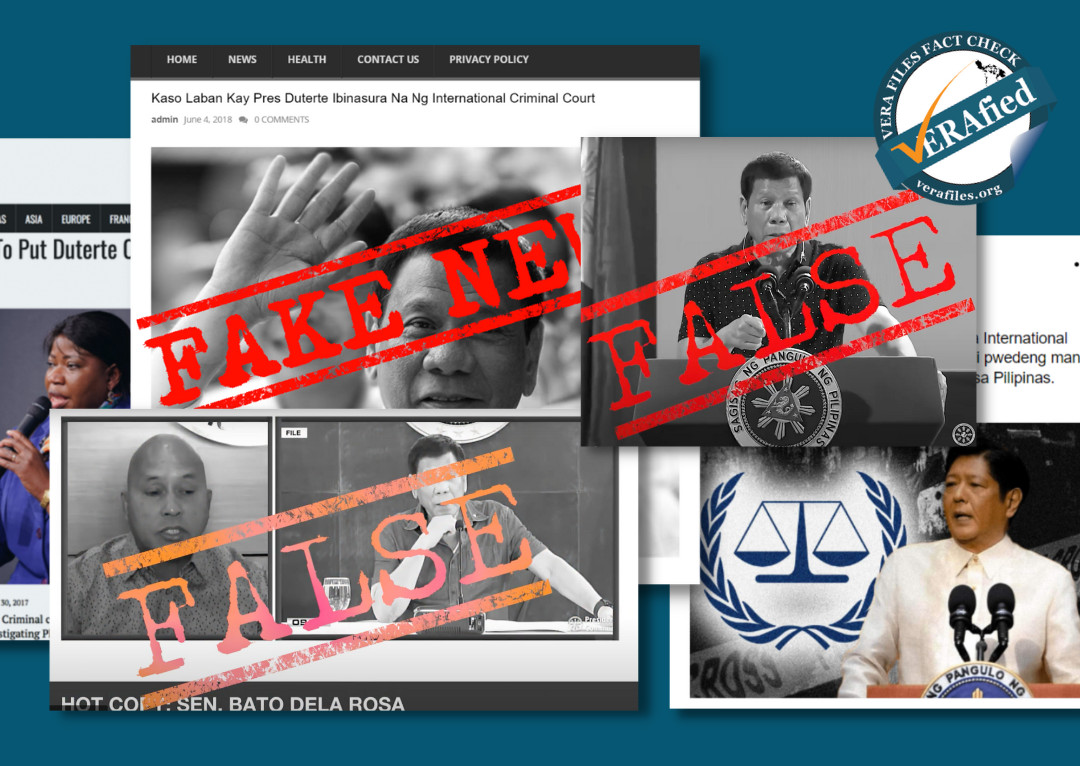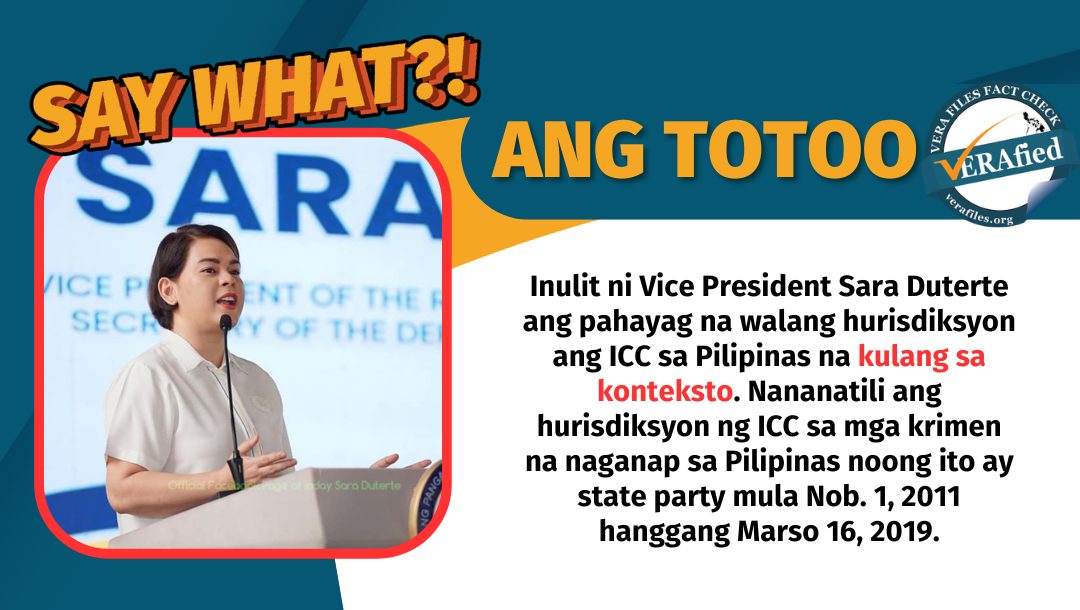(UPDATED) The Philippine News Agency (PNA), a state-run “web-based newswire service,” recently reported a wrong date for the establishment of the International Criminal Court (ICC).
STATEMENT
In a March 16 article quoting Chief Presidential Legal Counsel Salvador Panelo’s response to the Supreme Court’s (SC) dismissal of all petitions questioning President Rodrigo Duterte’s unilateral withdrawal from the ICC in 2018, the PNA wrote:
“The Philippines was officially out of ICC on March 17, 2019, or exactly a year after Duterte revoked the Rome Statute, a treaty that created the international court on Nov. 1, 2011.”
Source: Philippine News Agency, It’s time for ICC to stop interfering: Panelo (Archived), March 16, 2021
FACT
The PNA got the date wrong. The ICC was established on July 17, 1998, when its founding treaty, the Rome Statute, was adopted by 120 United Nations member-states, including the Philippines. (See VERA FILES FACT CHECK: Duterte FALSELY CLAIMS the EU created the ICC)
While already adopted, the treaty came into force only on July 1, 2002, also the day the ICC became operational, after it reached the quota of 60 countries to ratify, accept, approve, or accede to it. (See The ICC and the Filipino (Part 1))
Prior to withdrawal, the Philippines became a state party to the court after the administration of then president Benigno Aquino III got the concurrence of the Senate to ratify the Rome Statute in August 2011. The ratification officially took effect on Nov. 1, 2011, which the PNA mistook as the court’s founding date.
The Netherlands-based international court serves as the “court of last resort” for the “gravest crimes” of international concern, namely, genocide, war crimes, crimes against humanity, and the crime of aggression.
As of March 22, 123 states are parties to the ICC, including New Zealand, Japan, and South Korea.
BACKSTORY
On March 16, the SC announced the unanimous decision of its justices dismissing the three petitions contesting President Rodrigo Duterte’s unilateral withdrawal from the ICC for being “moot and academic.”
Presidential Spokesperson Harry Roque, who previously championed the Philippine ratification of the ICC, was quick to welcome the ruling and reiterated that the government “[does] not recognize” the court’s jurisdiction over the country.
Likewise, Panelo said the ruling “puts to rest the debate on the authority of the president to withdraw from treaties and international agreements,” noting it is the “sole” prerogative of the chief executive as head of state and chief architect of the country’s foreign policy.
But while the SC has yet to release a copy of its decision, a press release about it said the court “acknowledged” that the power of the president to unilaterally withdraw from any treaty is subject to Senate concurrence or any existing law:
“[T]he power of the President to withdraw unilaterally can be limited by the conditions for concurrence by the Senate or when there is an existing law which authorizes the negotiation of a treaty or international agreement or when there is a statute that implements an existing treaty.”
Source: Supreme Court, Press Release, March 16, 2021
The SC decision came two years after the country’s withdrawal from the international court officially took effect on March 17, 2019.
The Duterte government decided to leave the ICC in March 2018, a month after the court’s chief prosecutor Fatou Bensouda launched a preliminary examination into alleged crimes against humanity in the conduct of the war on drugs. (See VERA FILES FACT SHEET: Understanding the updates on the ICC’s preliminary examination into Duterte’s drug war)
Bensouda has said she intends to finish the preliminary examination before the end of her term in June. (See The ICC and the Filipino (Part 2))
UPDATE: At 7:49 p.m. on March 22, the PNA tweeted:
<img “=”” 1133818″=”” articles=”” image-marker”=”” src=”https://verafiles.org/wp-content/uploads/2021/03/PNA_correction.png” style=”” target=”_blank” www.pna.gov.ph=””/>
See here for the updated article.
Sources
Philippine News Agency, About the Agency, Accessed March 20, 2021
Philippine News Agency, It’s time for ICC to stop interfering: Panelo (Archived), March 16, 2021
International Criminal Court, The ICC at a Glance, Accessed March 16, 2021
International Criminal Court, 20 Question, Accessed March 16, 2021
United Nations, UN DIPLOMATIC CONFERENCE CONCLUDES IN ROME WITH DECISION TO ESTABLISH PERMANENT INTERNATIONAL CRIMINAL COURT | Meetings Coverage and Press Releases, July 20, 1998
International Criminal Court, The Court Today, Accessed March 16, 2021
International Criminal Court, Joining the International Criminal Court: Why does it matter?, Accessed March 22, 2021
United Nations, Ratification ceremony at UN paves way for International Criminal Court, April 11, 2002
International Criminal Court, About the ICC, Accessed March 16, 2021
United Nations, Rome Statute, Accessed March 16, 2021
Harry Roque personal blog page, ICC: At long last, Aug. 25, 2011
Presidential Communications Operations office, On the latest Supreme Court decision – Presidential Communications Operations Office, March 16, 2021
PTV, Presidential Legal Counsel on the SC decision upholding the withdrawal from the Rome Statute, March 16, 2021
Supreme Court, Press Release, March 16, 2021
International Criminal Court, The Philippines, Accessed March 16, 2021
International Criminal Court, Statement of the Prosecutor of the International Criminal Court, Fatou Bensouda, on opening Preliminary Examinations into the situations in the Philippines and in Venezuela, Feb. 8, 2018
International Criminal Court, Report on Preliminary Examination Activities (2020), Dec. 14, 2020
International Criminal Court, ICC – The Philippines becomes the 117th State to join the Rome Statute system, Aug. 30, 2011
Senate of the philippines, Committee Report No. 52 (15th Congress), Aug. 4, 2011
Official Gazette, Statement of the Presidential Spokesperson on the Philippines joining the ICC, August 24, 2011 | GOVPH, Aug. 24, 2011
(Ginagabayan ng code of principles ng International Fact-Checking Network sa Poynter, ang VERA Files ay sumusubaybay sa mga maling pahayag, flip-flops, nakaliligaw na mga pahayag ng mga pampublikong opisyal at kilalang personalidad, at pinasisinungalingan ang mga ito gamit ang tunay na ebidensya. Alamin ang inisyatibong ito at aming pamamaraan.)
